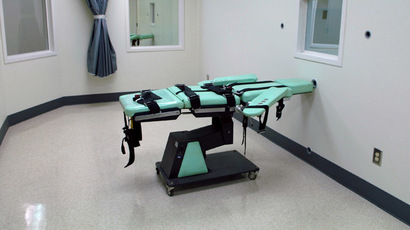Council of Europe condemns ‘cruel’ execution of Ohio killer, calls for protest

The Parliamentary Assembly of the Council of Europe expressed outrage at the “cruel and inhuman” execution of a convicted killer in Ohio with an untested drug that lasted an unusually long time, calling on Americans to protest against “such atrocities.”
Denis McGuire, 53, spent the last 15 minutes of his life gasping
for breath on Thursday while being executed with an
“experimental” drug cocktail. The execution
that lasted 25 minutes from the lethal ejection to the
pronouncement of his death has been described as one of the
longest since Ohio resumed capital punishment in 1999.
Marina Schuster (Germany, ALDE), General Rapporteur on the
abolition of the death penalty for the Parliamentary Assembly of
the Council of Europe (PACE), on Friday expressed her outrage
calling the people to protest against the use of
“inhumane” punishment.
“For a quarter of an hour, Mr McGuire suffered horribly, in front
of his wife and children, from pain and panic caused by
drug-induced breathing distress,” Schuster said, accordinb
to the PACE website. “No execution method is ever humane, but
this terribly botched state killing shows, for all to see, what a
cruel and inhuman punishment the death penalty is. This
punishment has no place in a civilized society. I call on the
American people to protest against such atrocities being
committed in their name.”
Family members of the death row inmate called the execution
unconstitutional and planned a Friday news conference to announce
a lawsuit over McGuire's death.
McGuire’s lawyers had attempted last week to block his execution.
They voiced concerns that the new death cocktail could lead to a
medical phenomenon known as “air hunger” and cause the
inmate to suffer "agony and terror."
The convicted killer's death was "a failed, agonizing
experiment," McGuire's attorney Allen Bohnert said. "The
people of the state of Ohio should be appalled at what was done
here today in their name."
McGuire was put to death by intravenous doses of two drugs, the
sedative midazolam and the painkiller hydromorphone. The method
was adopted after supplies of a previously used drug dried up
because the manufacturer refused to make them available for the
purpose of capital punishment. He was convicted and sentenced to
death for the 1989 rape and fatal stabbing of a pregnant newlywed
woman.














